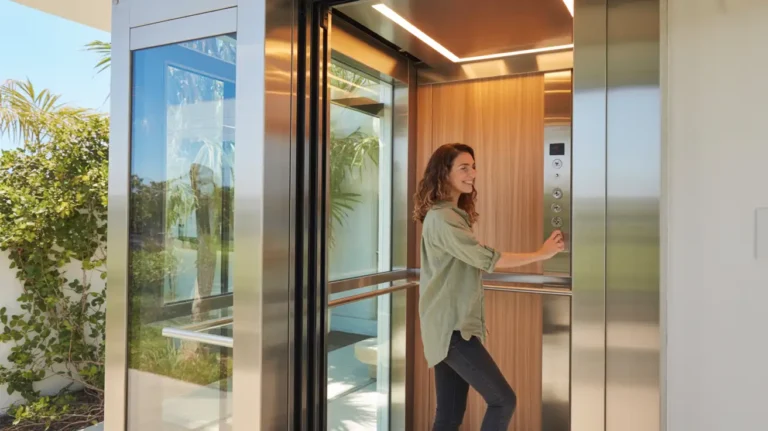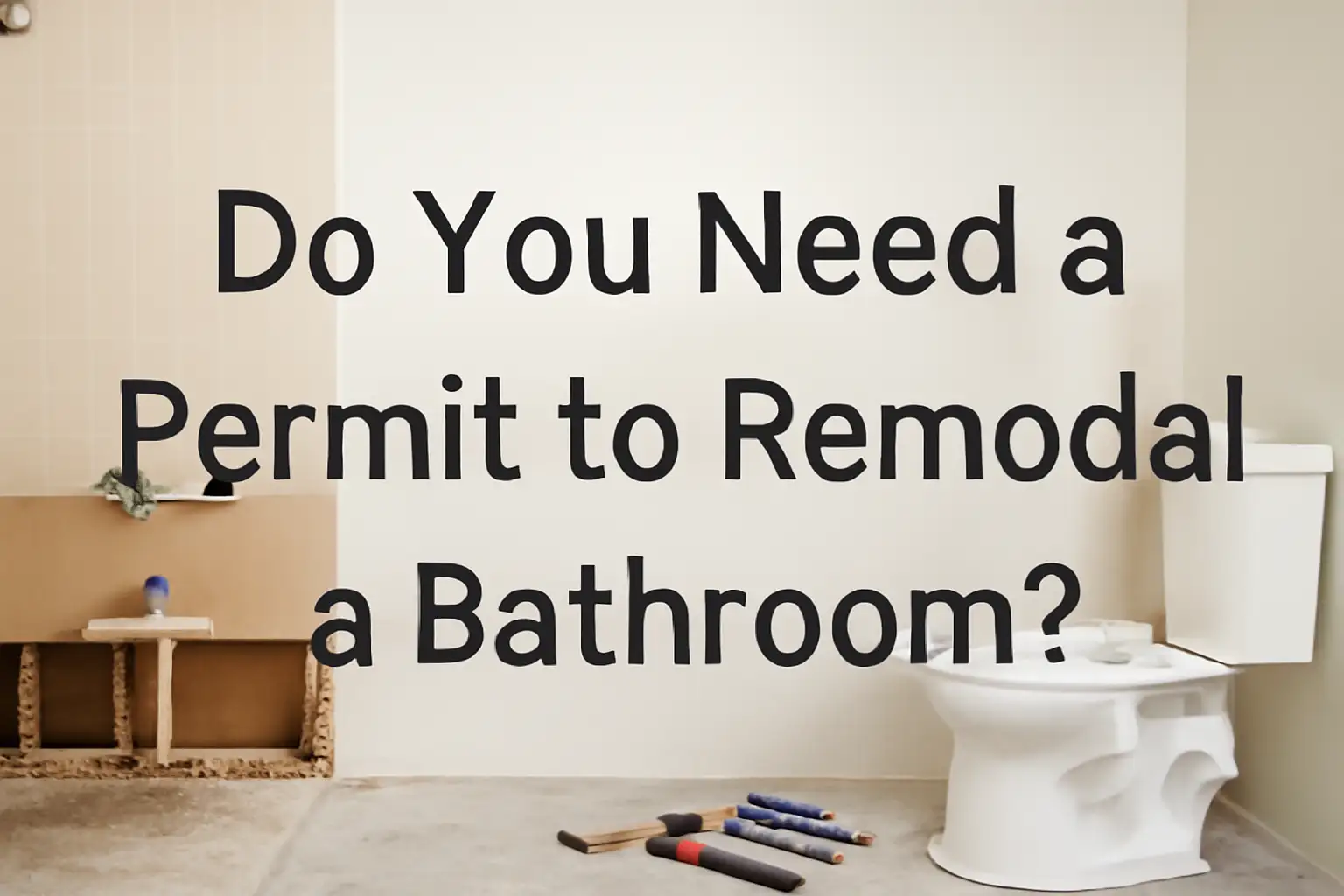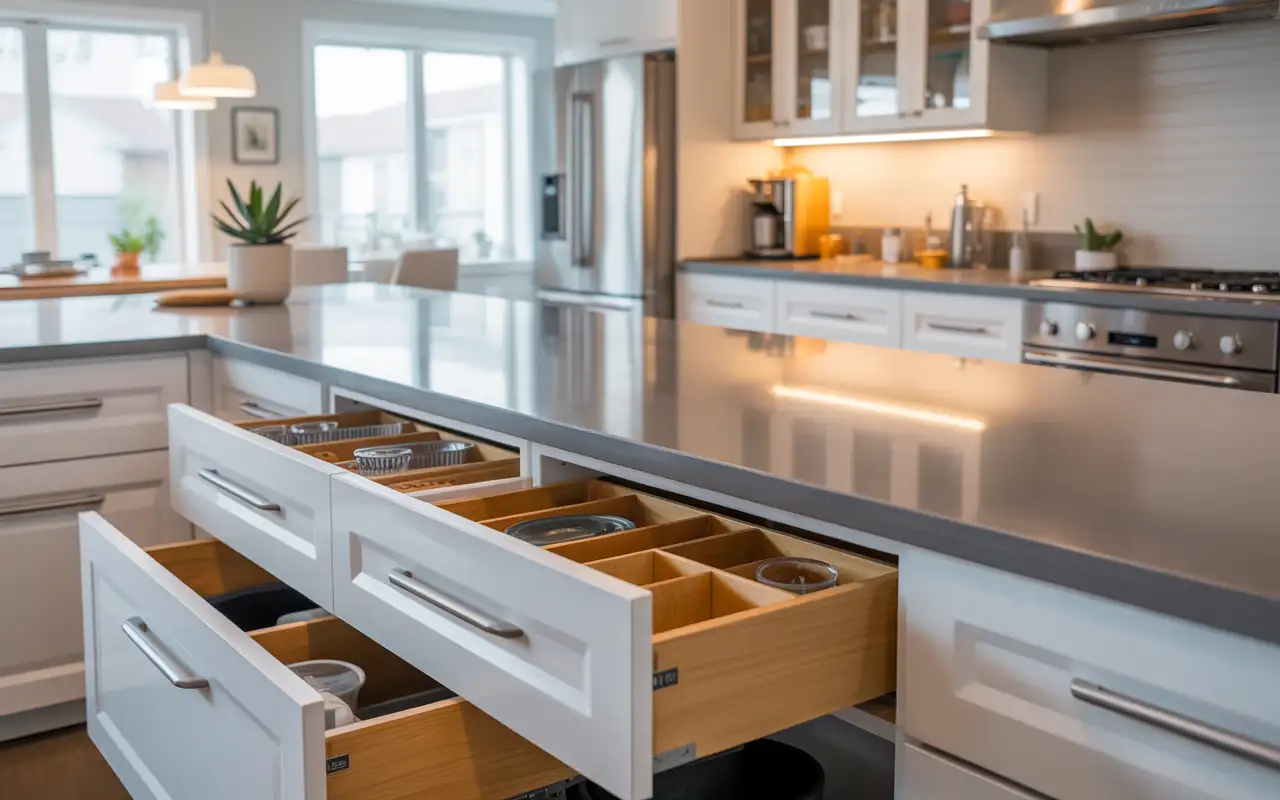Thinking about adding an elevator to your home? You’re not alone. More families are discovering that understanding home elevator cost is the first step toward making their homes work better for years to come. Whether you’re planning ahead for aging parents or simply want easier access between floors, knowing what to expect financially helps you make a smart decision. Let’s break down the real numbers and factors that matter.
Table of Contents
What Is a Home Elevator?
In simple terms, a home elevator is a mechanical lift that moves people and things between multiple levels of a house. Residential elevators are smaller than the big, industrial ones you find in shopping malls or business buildings. They suit a private home perfectly. Some are sleek glass tubes that look like they belong in a sci-fi movie, while others are more classic cabs that look like hallway closets when the door is closed. They give you a safe, dependable way to get around your house without using steps.
Average Cost of a Home Elevator in 2026

Let’s talk numbers. In 2026, you can expect to spend anywhere from $20,000 to $100,000 for a complete home elevator installation. The average residential elevator cost sits around $35,000 to $60,000 for most standard installations.
Here’s the reality: that $20,000 figure typically applies to basic outdoor lifts or simple two-floor systems with minimal features. Mid-range installations the ones most families choose fall between $35,000 and $60,000. These include through-the-floor elevators or traditional models with standard finishes and automatic doors.
On the higher end, luxury installations with custom cabinetry, glass walls, or systems serving three or more floors can easily reach $80,000 to $100,000 or more. Think of it like buying a car: you can get a reliable sedan or a luxury vehicle, and both will get you where you need to go.
What’s included in these prices? Most reputable installers bundle equipment, labor, basic installation, and warranty into their quotes. However, you’ll need to budget separately for permits (usually $500 to $2,000), structural modifications to your home ($2,000 to $15,000), and electrical work if needed ($1,000 to $5,000).
The house elevator cost has remained relatively stable over the past few years, though supply chain improvements in 2025 and 2026 have actually made some components more affordable than they were during the pandemic years.
Types of Home Elevators and Their Costs

Choosing the right elevator starts with understanding your options. Each type serves different needs and budgets.
Through-the-Floor (Shaftless) Elevators
These are the budget-friendly champions of the elevator world. A through-the-floor elevator moves straight up through a cutout in your floor without needing walls around it. Prices typically range from $20,000 to $45,000.
The beauty of shaftless models is their simplicity. No expensive hoistway construction means lower costs and faster installation. They’re perfect for homes where you need to connect just two floors and space is at a premium. Popular brands like Bruno Connect and Savaria Telecab dominate this category with proven track records.
Traditional Home Elevators
Traditional elevators are what most people picture a cab enclosed in a shaft that looks like a small closet when not in use. Expect to invest $40,000 to $65,000 for a standard two-story installation.
These systems require building a hoistway, which adds construction costs but also provides a more integrated look. You can customize the cab interior to match your home’s decor with wood panels, mirrors, or contemporary finishes. Traditional models work well when you need to serve three or more floors.
Hydraulic Elevators
Hydraulic systems use fluid pressure to lift the cab reliable technology that’s been around for decades. The cost of an elevator in a house using hydraulic technology runs $30,000 to $50,000.
These elevators are known for their smooth, quiet operation and ability to carry heavier loads, making them ideal if you regularly use a wheelchair or need to transport furniture between floors. The main consideration is that hydraulic systems require a machine room for the pump and tank, which some homes can’t easily accommodate.
Pneumatic (Vacuum) Elevators
Pneumatic elevators are the futuristic-looking tubes you might have seen in modern homes. They use air pressure to move the cab and cost between $35,000 and $60,000.
These glass cylinders don’t require a separate machine room and can be installed with minimal construction. They’re conversation starters, no question. However, they’re typically limited to 2-3 passengers and can be noisier than other options during operation.
Cable-Driven Elevators
Cable-driven systems are the traditional workhorses of the elevator industry. Home elevator prices for cable models range from $28,000 to $50,000.
These use a motor and cables similar to commercial elevators, just scaled down for residential use. They’re dependable and can serve multiple floors efficiently. Keep in mind that cables need inspection and occasional replacement every 10-15 years, adding to long-term maintenance considerations.
Geared and Gearless Traction Elevators
Geared traction elevators use a gearbox to control movement and cost $35,000 to $50,000. Gearless versions, which are more energy-efficient but pricier, run $45,000 to $65,000.
The main selling point here is energy efficiency. If you plan to use your elevator frequently, the lower monthly operating costs can offset the higher upfront investment over time. These are particularly popular in multi-story homes where the elevator gets daily use.
Glass/Panoramic Elevators
Want to make a statement? Glass elevators with panoramic views start around $65,000 and can exceed $100,000 for fully customized installations.
Models like the Savaria Vuelift feature elegant acrylic or glass walls that showcase your home while providing transportation. These are architectural features as much as functional equipment. If budget is a primary concern, these probably aren’t your first choice but if you’re building a luxury home, they’re worth considering.
Vertical Platform Lifts
Platform lifts are open-air elevators designed primarily for wheelchair users. They cost $5,000 to $15,000 significantly less than enclosed elevators.
These utilitarian lifts work well for indoor or outdoor installation and can navigate one story efficiently. They’re not enclosed, so they won’t work if you need climate control or privacy, but for straightforward accessibility needs, they offer excellent value.
Outdoor Elevators
Installing an outdoor elevator on your home’s exterior costs $15,000 to $35,000, making them one of the more affordable options.
External installation means no interior construction, which saves money and hassle. These work particularly well for homes where adding an interior shaft is impractical. The tradeoff is weather exposure, so you’ll want weather-resistant materials and regular maintenance to prevent corrosion.
Key Factors That Affect Home Elevator Costs
Understanding what drives prices helps you budget realistically and make informed choices.
Number of Floors and Travel Distance
Each additional floor adds $5,000 to $12,000 to your total cost. A two-story installation might cost $35,000, but serving three floors could push that to $45,000 or more.
Why? More floors mean longer rails, additional cables, stronger motors, and extra landing doors. It’s not just about distance it’s about the complexity of the entire system scaling up.
Elevator Size and Weight Capacity
Standard residential elevators accommodate 700-1,000 pounds, suitable for 2-3 people or one person with a wheelchair. Larger capacities increase costs by $3,000 to $8,000.
Think about your actual needs. If you’re planning for wheelchair use, you’ll need minimum dimensions of 36″ x 48″ and higher weight capacity. Oversizing beyond what you need just adds unnecessary expense.
Installation Complexity
Simple installations in new construction with easy access cost less. Retrofitting an existing home, especially one with challenging layouts or tight spaces, can add $5,000 to $20,000 to your project.
Contractors need to assess your home’s structure, possibly reinforce floors, create shaft openings, and work around existing utilities. Historic homes or those with concrete floors face additional challenges that translate to higher labor costs.
New Construction vs. Retrofitting an Existing Home
Planning an elevator during new home construction is significantly cheaper often 20-30% less than retrofitting. New construction means the builder can frame the shaft, run electrical lines, and integrate everything seamlessly from the start.
Retrofitting means working within existing constraints. You’re cutting through finished floors, potentially moving plumbing or HVAC, and dealing with surprises hidden in walls. Budget generously if you’re adding an elevator to an existing home.
Drive System Type
The mechanism that moves your elevator affects both upfront and operating costs. Hydraulic systems might cost less initially but use more energy. Traction systems cost more but run cheaper over time.
Most homeowners don’t need to become drive system experts. Your installer will recommend the best option for your situation. Just know that this component is a significant cost factor.
Cab Finishes and Customization Options
A basic melamine interior keeps costs down. Wood veneer, mirrors, custom millwork, or designer finishes can add $2,000 to $10,000 to your house elevator cost.
Here’s where personal preference meets budget reality. Your elevator will function the same with basic or luxury finishes; the difference is purely aesthetic. Prioritize what matters to you.
Door and Gate Configuration
Door choices significantly impact price. Manual accordion gates are the most affordable option. Automatic sliding doors similar to commercial elevators add $3,000 to $6,000 but provide better accessibility and a more refined appearance.
If you’re installing the elevator primarily for someone with limited mobility, automatic doors are worth the investment for ease of use and safety.
Automation and Smart Features
Basic elevators operate with simple push-button controls. Add smartphone connectivity, voice activation, or integration with home automation systems, and you’ll pay an additional $1,500 to $5,000.
These features are nice to have but not essential. Consider whether you’ll actually use them before spending extra.
Brand and Manufacturer
Established brands like Savaria, Bruno, and Stiltz command premium prices and generally deliver premium reliability and service. Lesser-known manufacturers might save you $5,000 to $10,000 upfront but could cost more in repairs and difficult parts sourcing down the road.
This is one area where reputation matters. Research warranty coverage and local service availability before choosing based on price alone.
Home Elevator Installation Costs Breakdown
Let’s separate what you’re actually paying for in your total investment.
Equipment and Materials
The elevator equipment itself, motor, rails, cab, controls typically accounts for 40-50% of your total cost. For a $45,000 installation, expect roughly $20,000 to $25,000 for the elevator system itself.
Labor and Professional Installation
Professional installers charge $45 to $75 per hour on average, with total labor running $8,000 to $20,000 depending on project complexity. This isn’t a DIY project; residential elevators must meet safety codes and require specialized expertise.
Site Preparation and Structural Modifications
Creating the shaft opening, reinforcing floors, and preparing the installation site costs $3,000 to $15,000. Historic homes or those requiring significant structural work fall on the higher end of this range.
Electrical Work and Wiring
Elevators need dedicated electrical circuits. Basic wiring runs $800 to $3,000, but if your electrical panel needs upgrading to handle the additional load, add another $1,500 to $3,000.
Permits and Inspection Fees
Building permits cost $300 to $2,000 depending on your location. Some jurisdictions also require multiple inspections throughout installation, adding $100 to $500 in inspection fees. Don’t skip this unpermitted work can create serious problems when selling your home.
How to Budget for a Home Elevator
Smart budgeting prevents financial surprises and project stress.
Setting Your Total Budget
Start with quotes from 2-3 reputable installers, then add 15-20% contingency for unexpected costs. If quotes average $40,000, budget $46,000 to $48,000 total.
Planning for Hidden and Unexpected Costs
Structural issues discovered during installation, electrical panel upgrades, HVAC ductwork relocation these surprises pop up frequently in retrofit projects. That contingency fund protects you from painful mid-project budget decisions.
Creating a Timeline for Your Project
Most installations take 4-8 weeks from contract signing to final inspection. Expect 2-3 weeks for permits, 1-2 weeks for site preparation, and 1-2 weeks for elevator installation and testing. Planning around this timeline helps you coordinate contractors and manage temporary inconveniences.
Home Elevator vs. Stair Lift: Cost Comparison
Many families weigh elevators against stair lifts as accessibility solutions. Straight stair lifts cost $3,000 to $8,000, while curved lifts run $8,000 to $15,000. That’s significantly less than even the most affordable home elevator.
However, stair lifts only solve the stairs problem. You still can’t transport items easily between floors, and they don’t add home value the way elevators do. If you’re only concerned about one flight of stairs and the budget is tight, a quality stair lift makes sense. But if you want a long-term solution that serves the whole household and adds property value, spending more on an elevator delivers better returns.
Think of it this way: a stair lift is a band-aid; an elevator is a permanent solution that transforms how your home functions.
Benefits of Installing a Home Elevator
Beyond the obvious convenience, residential elevators deliver multiple advantages.
Improved Accessibility and Mobility
The primary benefit is straightforward easy access to all floors for family members with mobility challenges. Whether that’s a grandparent with arthritis or a family member using a wheelchair, an elevator removes barriers.
Aging in Place Safely
Many families install elevators to allow aging parents to stay in their multi-story homes safely. It’s often more affordable than moving to assisted living or purchasing a single-story home.
Increased Home Value
Quality elevator installations can increase your home’s value by 10% or more, according to real estate professionals. That partially offsets your investment and makes your home more appealing to a broader range of buyers.
Convenience for Daily Living
Even young, healthy families appreciate elevator convenience. Hauling groceries, moving furniture, or carrying laundry becomes effortless. It’s a quality-of-life upgrade you’ll use daily.
Enhanced Safety
Stairs cause thousands of fall-related injuries annually. Elevators eliminate this risk for vulnerable family members, providing peace of mind along with convenience.
Is a Home Elevator Worth the Investment?
This depends on your specific situation. If you’re planning to stay in your multi-story home for 10+ years and have family members with mobility needs, the investment makes strong financial and practical sense. The combination of daily convenience, safety, and added home value provides solid returns.
For families in temporary homes or those without accessibility needs, the cost might not justify the benefits. Consider your long-term plans, current and anticipated mobility needs, and financial capacity before committing to this significant investment.
How to Choose the Right Home Elevator for Your Budget
Making the right choice means balancing needs, wants, and financial reality.
Assess Your Mobility Needs
Start with the basics: Who will use the elevator? Do they need wheelchair accommodation? How many floors must it serve? Answering these questions eliminates unsuitable options immediately.
Evaluate Your Home’s Space and Structure
Measure available space and have a structural engineer assess your home if you’re retrofitting. Some elevator types simply won’t work in certain homes due to space or structural limitations.
Compare Elevator Types and Features
Research the elevator types we’ve covered and create a shortlist of models that fit your needs and budget. Focus on functionality first, aesthetics second.
Get Multiple Quotes from Installers
Contact at least three installers for detailed quotes. This helps you understand fair market pricing and identify outliers. When working with experienced professionals like San Diego Home Remodeling, you’ll receive transparent pricing and expert guidance through the selection process. Their comprehensive home remodeling services in San Diego include elevator installation expertise that ensures your project meets all building codes and delivers quality results.
Consider Long-Term Costs
Factor in annual maintenance ($300 to $600), energy costs ($20 to $50 monthly), and eventual part replacements. A slightly more expensive elevator with lower operating costs might be the better value over 20 years.
What to Expect During the Installation Process
Understanding the installation workflow helps you prepare properly.
Initial Consultation and Home Assessment
Your installer will visit your home to assess feasibility, discuss options, and provide preliminary cost estimates. Be prepared to discuss your needs, show potential installation locations, and ask questions.
Design and Planning Phase
Once you’ve selected an elevator model, the installer creates detailed plans showing shaft location, electrical requirements, and structural modifications needed. This phase typically takes 1-2 weeks.
Obtaining Permits and Approvals
Your installer usually handles permit applications, but expect 2-4 weeks for approval in most jurisdictions. Some areas require architectural drawings prepared by licensed professionals.
Site Preparation and Construction
This is the messy phase cutting floor openings, building the shaft (if needed), running electrical lines, and making structural reinforcements. Expect 1-2 weeks of active construction with dust, noise, and limited access to affected areas.
Elevator Installation and Testing
Once site prep is complete, the elevator technicians install the actual system. This takes 3-5 days for most residential installations. After installation, they run multiple test cycles and calibrate all systems.
Final Inspection and Approval
A building inspector must approve the installation before you can legally use your elevator. Schedule this inspection promptly after installation is complete. Once approved, you’ll receive certification and operation training.
Tips for Reducing Home Elevator Costs
Smart choices can save thousands without sacrificing quality or safety.
Choose a Cost-Effective Elevator Type
Through-the-floor and outdoor elevators offer the best value for basic two-story access. Reserve premium options for situations where they’re truly necessary.
Minimize Customization Options
Standard finishes and configurations cost significantly less than custom options. Choose the simplest version that meets your actual needs.
Plan Installation During Home Construction
If you’re building new or doing major renovations, include the elevator in original plans. The integrated approach saves 20-30% compared to retrofitting later.
Compare Multiple Contractors
Get detailed quotes from several installers. But don’t automatically choose the lowest bid—verify reputation, warranty coverage, and what’s included in quoted prices.
Consider Simpler Door Configurations
Manual gates cost less than automatic doors. If the budget is tight and all users can operate manual gates safely, this saves $3,000 to $5,000.
Regional Cost Variations Across the United States
Where you live has a big effect on how much a private elevator costs. Prices are 20–35% higher in big cities like New York, Los Angeles, and San Francisco than they are in the rest of the country. This is because of stricter building rules and higher labor costs.
Prices are usually more reasonable in the Midwest and the South. In California, a typical installation might cost $50,000, but in Texas or Ohio, it might cost $38,000 to $42,000.
Also, permit prices vary widely. In some rural counties, they’re only $200, but in cities like San Francisco or Seattle, they’re $3,000 or more. When you’re budgeting for your project, consider local costs.
While labor costs might be lower in rural areas, equipment delivery fees might be higher, and installers might be less available. When comparing prices or setting your budget, keep these regional differences in mind.
How Long Do Home Elevators Last?
With regular maintenance, quality residential elevators can last 20 to 25 years. Some well-maintained systems have worked successfully for more than 30 years.
How long anything lasts depends a lot on how often it is used, how well it is cared for, and its surroundings. A lift used 5 to 10 times a day will last longer than one used more than 50 times a day. Regular yearly inspections, lubrication, and adjustments can greatly extend the life of the equipment.
After 15 to 20 years, you may need to replace important parts like motors and controllers, which can cost between $3,000 and $8,000. But this is still cheaper than replacing the whole thing and gives the elevator another 10 to 15 years of useful life.
Common Mistakes to Avoid When Buying a Home Elevator
The biggest mistake is ignoring the maintenance contract. Like a car, an elevator needs a “tune-up” once a year. Another mistake is over-customizing. While you want it to look nice, spending $10,000 on a gold-leaf ceiling rarely adds to the resale value. Stick to timeless, clean designs.
Conclusion
When you want to know how much a home elevator costs, you need to look beyond the price tag and consider how difficult it is to install, how much it will cost to maintain over time, and how much value it adds to your home and family. Residential lifts come in a range of prices to fit any need, whether you want to age in place, make your home more accessible, or make life easier.
First, think about what you need. Then, get quotes from several professionals. Finally, choose the best service over the cheapest one. The safe, dependable vertical transportation you bought will last your family for many years.
Frequently Asked Questions
How much does a 2-story home elevator cost?
A standard two-story home elevator typically costs $28,000 to $55,000 installed, depending on type and features. Through-the-floor models start around $28,000, while traditional enclosed elevators with automatic doors run $40,000 to $55,000. This includes equipment, installation, and basic finishes but excludes permits and major structural modifications.
What is the cheapest type of home elevator to install?
Outdoor elevators and basic vertical platform lifts are the most affordable options, starting around $8,000 to $15,000 for simple installations. For enclosed indoor elevators, through-the-floor (shaftless) models offer the best value at $20,000 to $35,000. These skip expensive hoistway construction while still providing reliable vertical transportation.
Do home elevators require a lot of maintenance?
Home elevators need annual professional maintenance costing $300 to $600. This includes inspection, lubrication, adjustments, and safety testing. Compared to other home systems, this is relatively minimal. Most elevators run reliably for years with just annual service. Emergency repairs occur infrequently with proper maintenance typically once every 3-5 years for minor issues.
Will installing a home elevator increase my property taxes?
Possibly, but not always. Adding an elevator increases your home’s assessed value, which can raise property taxes. However, many jurisdictions offer tax exemptions for accessibility improvements. Contact your local assessor’s office to understand specific rules in your area. Even with potential tax increases, the benefits often outweigh this modest additional cost.
Can I install a home elevator myself to save money?
No. Residential elevators must be installed by licensed professionals to meet safety codes and ensure proper operation. DIY installation is illegal in most jurisdictions, voids warranties, and creates serious safety risks. Additionally, improperly installed elevators create liability issues and problems when selling your home. Professional installation is non-negotiable.
How long does home elevator installation take?
Most home elevator installations take 4-8 weeks from contract signing to final inspection. This includes 2-3 weeks for permits, 1-2 weeks for site preparation and construction, 3-5 days for actual elevator installation, and final inspection scheduling. Simple outdoor lifts might complete in 3-4 weeks, while complex multi-story retrofits can take 10-12 weeks.







